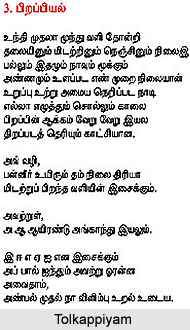 Tolkappiyam is the most ancient Tamil grammar, ascribed to a poet called Tolkappiyar of the first century BC, and of great importance in tracing the history of Tamil theatre. It contains three chapters, of which the one on pond has a section called meyppattiyal. This chapter deals with eight emotions that could be built up in the body and mind. Each of these emotions has four different aesthetic appeals. From them, we can therefore derive thirty-two different expressions. This is the section most relevant to performers in dance and theatre.
Tolkappiyam is the most ancient Tamil grammar, ascribed to a poet called Tolkappiyar of the first century BC, and of great importance in tracing the history of Tamil theatre. It contains three chapters, of which the one on pond has a section called meyppattiyal. This chapter deals with eight emotions that could be built up in the body and mind. Each of these emotions has four different aesthetic appeals. From them, we can therefore derive thirty-two different expressions. This is the section most relevant to performers in dance and theatre.
The eight emotions are nakai i.e. humour, azhukai i.e. sorrow, ilivaral i.e. satire, marutkai i.e. innocent confusion, accam i.e. fear, perumitam i.e. pride, vekuli i.e. anger, and uvakai i.e. joy. Scholars have compared them to the eight rasas of Sanskrit aesthetics. The ninth, santa rasa, of stillness and calm, which may have evolved in later classical times, is not mentioned as a separate meyppattu i.e. `physicalization of feeling` in this work. The emotions are also conventionally classified according to the aintinai, the five ecological zones into which Tamils divided their landscape. Tolkappiyar`s formula suggests that only persons with precise sensibilities of the eye and ear could receive these emotions. This section helps in actors` training.
This article is a stub. You can enrich by adding more information to it. Send your Write Up to content@indianetzone.com













